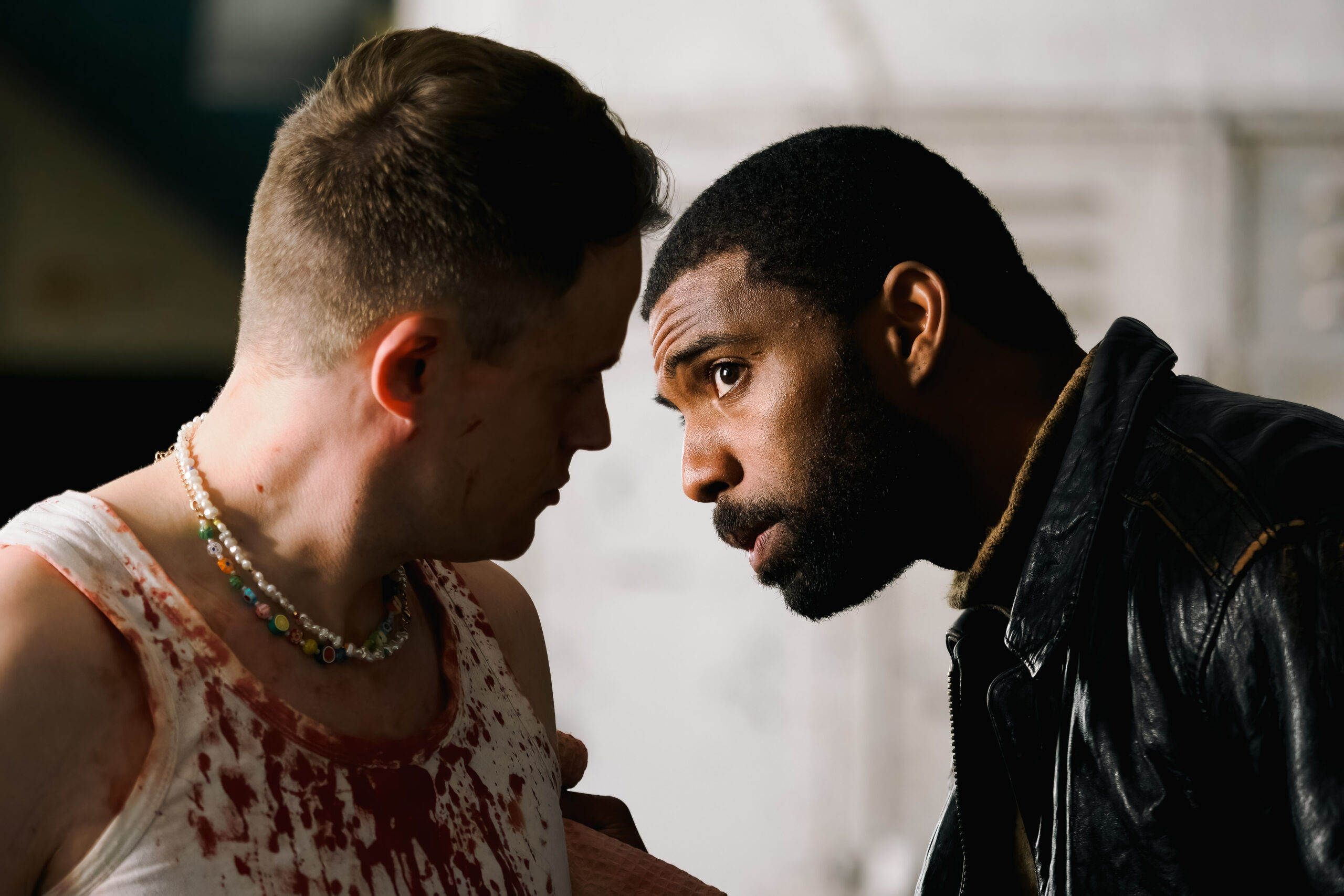(Buffalo 8 Productions)
Ealing Productions, 2023. Crime/Dramedy. 126 min.
Grade: 2.5 out of 4
If a director has done their job, there shouldn’t be a need for a “Director’s Statement” in the press kit. The film itself is the statement; Steven Spielberg doesn’t need to write down a separate note about what Schindler’s List means. Hell, David Lynch’s press kits don’t even summarize his plots, because he’d rather let the audience interpret it as they will. Written statements are quite common on the indie/festival level, however, and mostly redundant.
Pelayo De Lario’s statement about Tales of Babylon is just curious in its grandiosity, as he claims his second feature is, “a new kind of movie, a movie created by a new type of filmmaker, one that caters to the wants and desires of a new generation of viewers who see the world and entertainment in a whole different way, who interpret films and tv with a different lens a different way of understating pacing and rhythm. A generation who needs constant gratification and seeks it everywhere they go…” If this is truly the case, then what’s old is new again, because the tastes of this generation would seem to look a lot like the tastes of mine, namely early Quentin Tarantino and Guy Ritchie movies. Some filmmakers aspire to make the next Pulp Fiction; De Lario has made the first one again, with a mildly different flavor.
It’s not like De Lario’s unaware of his influences, either. His primary characters, two hitmen named “X” (Ray Calleja) and “Y” (Aaron Cobham)who are white and black, respectively, discuss Samuel L. Jackson specifically and Pulp Fiction more generally in the same manner as Jules and Vincent waxing poetic about the McDonald’s menu in Paris. At one point, they specifically reference the way their situation may or may not mirror a specific twist from that movie. Meanwhile, the structure definitely does that, with nonlinear storytelling divided by chapter headings that are occasionally quite specific about the time lapse. These probably aren’t necessary – the settings and costumes are distinctive enough to orient us in the timeline every time, but it probably helps to cue an unsuspecting audience going in cold.
De Lario’s best demonstration of his directorial skill is his biggest departure from QT – an opening sequence that stays close and centered on the face of sadsack Martin (Philip Tomlin), a bartender who floats through his day being bullied by local thugs and his boss, eating noodles, masturbating, and falling asleep to do it all again. With fades, music, and Kubrickian symmetrical composition, he establishes a routine in order to inevitably, dramatically break it. If anyone’s guessed the Pulp Fiction model at that point, they’ll anticipate what’s next – Martin will disappear entirely until the climax, as the story of two hitmen takes over the narrative.
The entangled plots, set in London, involve a kingpin known as the Silver Dragon, or, more specifically, Mr. Banksbi (Clive Russell). His granddaughter (Billie Gadsdon) has been kidnapped, and his grandson (Dylan Gadsdon) is skimming from his drug stash. In addition to X and Y, others are on the case, notably the vaguely eastern European man dubbed the Professional (Albert Tallski), and an eyepatch-wearing hitwoman alternately named Mother Nature, Mummy, and Svetlana (Maria Crittell). If it all seems complicated, it’s mostly so for being told out of order; one gets the sneaking suspicion that, front to back, events as depicted would simplify immensely.
Many of the scenes follow the template perfected by Inglourious Basterds, with two or more characters having a loaded, probing conversation that slowly but inevitably leads to violence. De Lario gets the cat and mouse element very well, but he’d generate more suspense if the outcome were less predictable – it’s usually clear exactly who is going to do violence to whom at the end, so the only question is when. It’s an issue with the ending, as well, which metes out pretty much exactly the justice and outcome you anticipate. A mid-credits scene, however, is unexpected in content and in its mere existence, should anyone know enough to stick around for it.
Use of existing tropes and obvious inspiration from other movies is neither a crime nor a dealbreaker – if it were, Tarantino, for one, wouldn’t have a career. De Lario isn’t selling himself short in implying that in two hours, he’s able to pace his film in a way that even the attention-span challenged ought to enjoy. The template may be almost entirely borrowed, but his settings and characters prove distinctly evocative. From an empty, rusty cargo ship to a creeper-covered townhouse cleverly adapted into a mini drug factory, Tales From Babylon finds unique-feeling abandoned locations, and populates them with fresh riffs on genre archetypes, from the childlike, volatile X to the awfully misguided vigilantism of Martin. The Silver Dragon is yet another Scotsman who yells profanities in order to be scary, and I’m frankly ready for a less demonstrative style of British crime king, but Russell’s hamminess is undeniably a kick in its own way.
Now, Mr. De Lario, you’ve made an impression. With the obvious references out of your system, maybe you can really surprise us next time.

